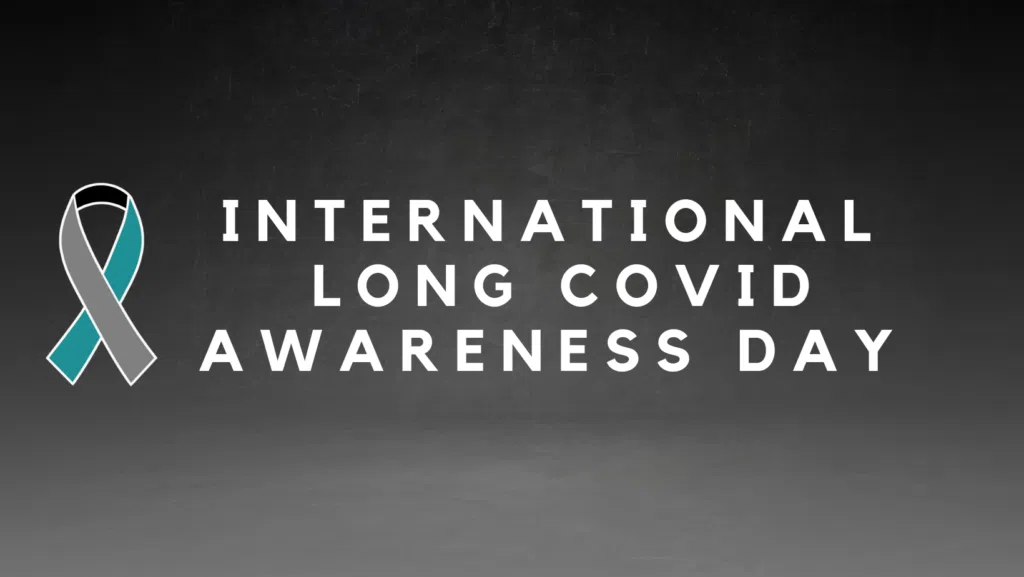 Today, we unite in solidarity to observe Long COVID Awareness Day. This day holds profound significance for countless individuals worldwide. We stand together in spirit and purpose, recognizing the extensive impact of SARS-CoV-2.
Today, we unite in solidarity to observe Long COVID Awareness Day. This day holds profound significance for countless individuals worldwide. We stand together in spirit and purpose, recognizing the extensive impact of SARS-CoV-2.
This day serves as a beacon in our collective efforts to raise awareness and bolster support for those living with persistent symptoms following COVID-19 infection.
15 March is the International Long COVID Awareness Day
March 15th marks International Long COVID Awareness Day, a day dedicated to raising awareness and amplifying the voices of millions who continue to suffer from the prolonged effects of COVID-19. For many, the acute phase of infection has passed, but the lingering symptoms persist, often in ways that disrupt daily life, work, and relationships.
International Long COVID Awareness Day serves as a rallying point for patients, healthcare providers, researchers, and advocates to come together and push for increased funding, clinical trials, and understanding of this complex, post-viral condition. By standing together, we can advocate for the critical research needed to identify the causes, improve diagnostic tools, and develop effective treatments for Long COVID.
What is Long COVID?
Long COVID, also known as post-acute sequelae of SARS-CoV-2 infection (PASC), is a multifaceted and often debilitating condition that affects individuals long after their initial COVID-19 infection has cleared. The National Academies of Sciences, Engineering, and Medicine (NASEM) have defined Long COVID as “an infection-associated chronic condition (IACC) that occurs after SARS-CoV-2 infection and is present for at least 3 months as a continuous, relapsing and remitting, or progressive disease state that affects one or more organ systems.” Long COVID can present with a variety of symptoms, ranging from mild to severe. While the majority of people recover from COVID-19 in a few weeks, for some, the virus leaves a lasting impact, triggering health problems that can severely impair their quality of life.
The condition is complex, and its symptoms can mimic other chronic conditions, such as myalgic encephalomyelitis/chronic fatigue syndrome (ME/CFS), where post-exertional malaise (PEM) and profound fatigue are key features. The overlapping symptoms of Long COVID and ME/CFS suggest a potential connection, as both conditions often involve dysregulation of the immune system, mitochondrial dysfunction, and difficulties in energy production.
Long COVID is not limited to those who experienced severe illness; it also affects people who had mild or even asymptomatic cases of COVID-19. This unpredictability complicates identifying those at risk, emphasizing the importance of continued scientific research in this field to develop effective treatments and improve patient outcomes.
Common Symptoms
Long COVID can present symptoms that vary in severity, duration, and impact. These often fluctuate, making it difficult for patients to establish a routine or feel in control of their health. Some of the most commonly reported symptoms include:
- Chronic fatigue: Profound exhaustion that doesn’t improve with rest. This fatigue can make even basic daily tasks like walking or working a challenge, reflecting similar patterns seen in ME/CFS.
- Cognitive impairment: Often referred to as “brain fog,” this symptom includes difficulties with memory, focus, and decision-making, impacting work and personal life.
- Breathing difficulties: Shortness of breath and chest pain are common complaints, even in those who had only mild respiratory symptoms during their initial infection.
- Muscle and joint pain: Lingering muscle aches and joint stiffness can make movement painful, often exacerbating feelings of fatigue and limiting mobility.
- Gastrointestinal problems: Many Long COVID patients report issues such as nausea, bloating, and other digestive problems that disrupt normal eating habits and cause discomfort.
- Neurological symptoms: Headaches, dizziness, and sensory changes, such as altered taste or smell, are common and can be disruptive to daily functioning.
Symptoms may come and go, intensify after physical exertion or stress, or appear without any clear trigger. This can leave patients feeling frustrated and powerless, especially as many find that healthcare systems are still struggling to keep up with the complexity of the condition.
For those living with Long COVID, each symptom tells part of a larger story—one that demands more attention, understanding, and medical breakthroughs.
You Can Help Us Find a Cure for Long COVID and ME/CFS
These stories—and many others—prove the urgent need for continued research, better diagnostic tools, and effective treatments. Patients like Charlotte, Sean, and Meghan are why organizations like Open Medicine Foundation work tirelessly to drive scientific discoveries that could lead to life-changing treatments. With your support, we can advance our mission to raise awareness and conduct vital research into these chronic conditions.
OMF supported Long COVID Research Studies
from funds generously donated by the Patient-Led Research Fund (PLRF), a project of the Patient-Led Research Collaborative and funded by Balvi Filantropic Fund
1. Characterizing Non-restorative Sleep in Post-viral Disease to Advance Intervention Innovations:
Harvard Medical School and the Open Medicine Foundation Supported Ronald G. Tompkins Harvard ME/CFS Collaboration
We are thrilled to announce that this study has officially started. Led by Janet Mullington, PhD, this project aims to characterize several features of sleep regulation in ME/CFS and Long COVID compared with age and sex matched healthy sleep controls. The study investigates three primary components:
- Sleep patterns and how they relate to the body’s natural rhythm (circadian dysfunction)
- Changes in immune function, specifically looking at a type of molecules called specialized pro-resolving mediators (SPMs) and how they’re affected by sleep problems
- Brain electrical activity
2. Systems Biology Approaches to Uncovering Disease Mechanism and Drug Repurposing For Long COVID:
Massachusetts General Hospital and the Open Medicine Foundation Supported Computational Research Center for Complex Diseases
Led by Wenzhong Xiao, PhD, this project uses deep machine learning and network medicine to analyze clinical information, research findings, and multi-omics data of Long COVID, ME/CFS, and related diseases. The analysis incorporates a collective knowledge-base of drugs, diseases, genes, and symptoms to discover disease gene modules. This project aims to identify potential drugs as candidates for repurposing for these illnesses.
3. Multi-omic Approaches to Solve Post-Acute COVID-19/SARS-CoV-2 Syndrome:
Université de Montréal and the Open Medicine Foundation-Supported ME/CFS Collaborative Center at CHU Sainte-Justine/Université de Montréal
Led by Alain Moreau, PhD, this project hypothesizes that Long COVID, and ME/CFS after COVID, is the result of a broad molecular-level reorganization occurring primarily at the epigenetic level. The study aims to understand the molecular mechanisms underlying the development of long-term sequelae following a SARS-CoV-2 infection, by looking at 4 specific aims:
- Global expression profiling of circulating microRNAs
- Global DNA methylation profiling
- Global proteomic plasma profiling
- Global metabolomic plasma and urine profiling.
To learn more about this international study, click here.
We are actively working to raise additional funds to continue these critical studies. We all need this research now, and we need your help today so that millions can return to health tomorrow.
How You Can Help:
Participate in Research
- Participate in Research: Join OMF StudyME Registry; a recruitment tool to connect individuals interested in participating in research studies with the researchers conducting them. Over 8300 participants joined already! With OMF StudyME, we are helping recruit for Long COVID studies at:
- University of New England, Australia
- Bateman Horne Center, Salt Lake City, US
- Scripps Medical Center, San Diego, US
- Mt Sinai, New York, US
- Harvard Medical School: Beth Israel Deaconess Medical Center, Boston, US
- Stanford University, Stanford, CA
Spread the Word
Raise awareness by sharing information about our studies with your network.
Support Our Work
Your donations allow us to continue conducting vital research studies. Consider making a donation today to support our ongoing efforts.
Thank you for joining us in our mission to combat Long COVID and ME/CFS and provide hope for a brighter future. Together, we can make a difference.


